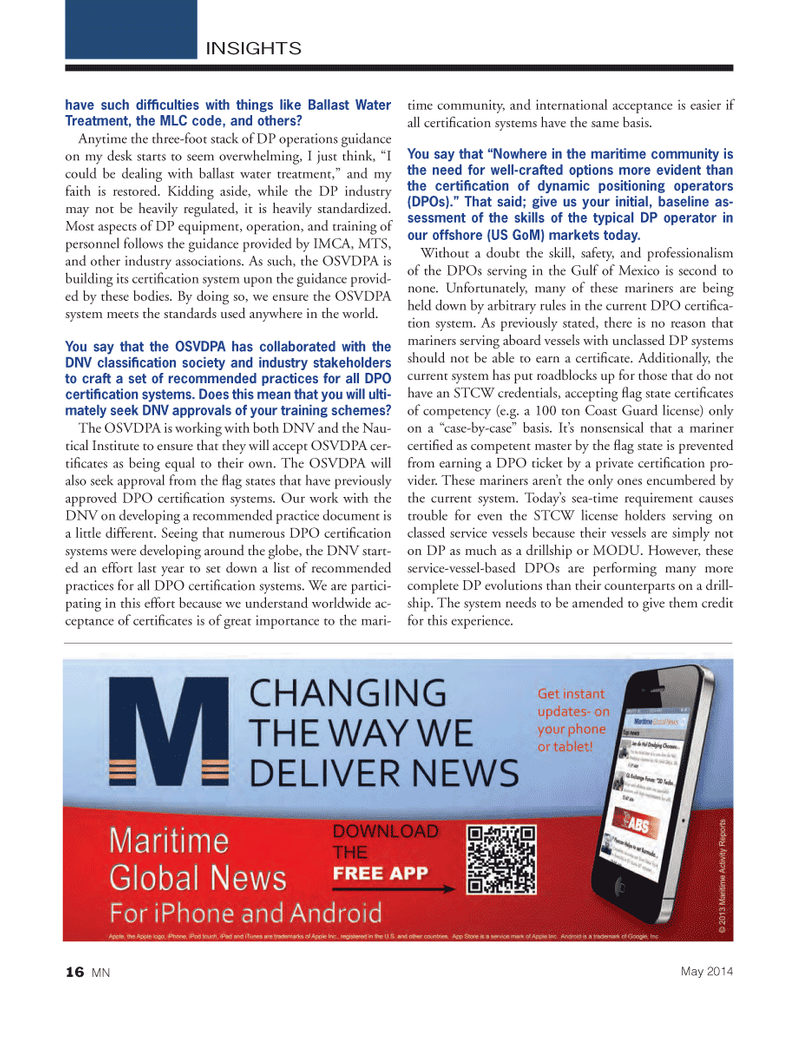
Page 16: of Marine News Magazine (May 2014)
Offshore Annual
Read this page in Pdf, Flash or Html5 edition of May 2014 Marine News Magazine
have such diffi culties with things like Ballast Water
Treatment, the MLC code, and others?
Anytime the three-foot stack of DP operations guidance on my desk starts to seem overwhelming, I just think, “I could be dealing with ballast water treatment,” and my faith is restored. Kidding aside, while the DP industry may not be heavily regulated, it is heavily standardized.
Most aspects of DP equipment, operation, and training of personnel follows the guidance provided by IMCA, MTS, and other industry associations. As such, the OSVDPA is building its certifi cation system upon the guidance provid- ed by these bodies. By doing so, we ensure the OSVDPA system meets the standards used anywhere in the world.
You say that the OSVDPA has collaborated with the
DNV classifi cation society and industry stakeholders to craft a set of recommended practices for all DPO certifi cation systems. Does this mean that you will ulti- mately seek DNV approvals of your training schemes?
The OSVDPA is working with both DNV and the Nau- tical Institute to ensure that they will accept OSVDPA cer- tifi cates as being equal to their own. The OSVDPA will also seek approval from the fl ag states that have previously approved DPO certifi cation systems. Our work with the
DNV on developing a recommended practice document is a little different. Seeing that numerous DPO certifi cation systems were developing around the globe, the DNV start- ed an effort last year to set down a list of recommended practices for all DPO certifi cation systems. We are partici- pating in this effort because we understand worldwide ac- ceptance of certifi cates is of great importance to the mari- time community, and international acceptance is easier if all certifi cation systems have the same basis.
You say that “Nowhere in the maritime community is the need for well-crafted options more evident than the certifi cation of dynamic positioning operators (DPOs).” That said; give us your initial, baseline as- sessment of the skills of the typical DP operator in our offshore (US GoM) markets today.
Without a doubt the skill, safety, and professionalism of the DPOs serving in the Gulf of Mexico is second to none. Unfortunately, many of these mariners are being held down by arbitrary rules in the current DPO certifi ca- tion system. As previously stated, there is no reason that mariners serving aboard vessels with unclassed DP systems should not be able to earn a certifi cate. Additionally, the current system has put roadblocks up for those that do not have an STCW credentials, accepting fl ag state certifi cates of competency (e.g. a 100 ton Coast Guard license) only on a “case-by-case” basis. It’s nonsensical that a mariner certifi ed as competent master by the fl ag state is prevented from earning a DPO ticket by a private certifi cation pro- vider. These mariners aren’t the only ones encumbered by the current system. Today’s sea-time requirement causes trouble for even the STCW license holders serving on classed service vessels because their vessels are simply not on DP as much as a drillship or MODU. However, these service-vessel-based DPOs are performing many more complete DP evolutions than their counterparts on a drill- ship. The system needs to be amended to give them credit for this experience.
INSIGHTS
May 2014 16 MN
MN May14 Layout 1-17.indd 16 4/21/2014 10:39:43 AM

 15
15

 17
17
